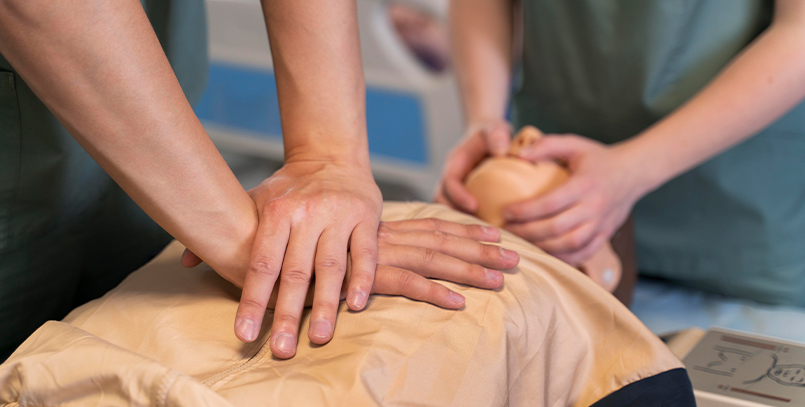
Cardiac arrest can happen anytime, anywhere. Being prepared with lifesaving skills like automated external defibrillator (AED) use and cardiopulmonary resuscitation (CPR) can make the difference between life and death for someone experiencing sudden cardiac arrest. Winnipeg offers numerous options for comprehensive AED and
CPR Training in Winnipeg for everyone from individuals to large organizations.
Sudden Cardiac Arrest: A Threat to Public Safety
Sudden cardiac arrest claims over 40,000 lives per year in Canada. It can strike without warning, cutting off blood flow to the brain and other vital organs within minutes. Cardiac arrest is triggered by an electrical malfunction that causes the heart to flutter instead of pumping normally. The only effective treatment is defibrillation using an AED to deliver an electrical shock restarting regular heart rhythm. Tragically, less than one third of out-of-hospital cardiac arrest victims receive potentially lifesaving defibrillation from bystanders. The probability of survival drops rapidly from over 50% at minute 3 to less than 5% by minute 10 emphasizing the urgency for rapid response.
AED & CPR Skills Save Lives in the Critical Window
Effective bystander response with AED defibrillation and CPR chest compressions can dramatically improve cardiac arrest survival outcomes. These basic skills buy precious minutes until EMS teams arrive by restoring blood circulation to vital organs and stabilizing the victim. Starting CPR immediately maintains a minimum level of oxygenated blood flow while applying an AED for analysis and defibrillation jump starts the heart back into a viable rhythm.
Recent advances make AED devices extremely easy to operate correctly with clear voice prompts guiding the responder.
CPR Training Winnipeg also continues to be simplified maximizing chest compression efficiency while minimizing ventilations. All that is needed is calling emergency services, pushing hard and fast in the center of the chest at 100-120 compressions per minute, and attaching and following AED prompts to apply a lifesaving shock. These basics skills now take minutes to teach while offering years of preparedness and confidence to respond effectively when lives hang in the balance.
The First Three Minutes Are Critical
As the American Heart Association's chain of survival emphasizes, a swift response is paramount when dealing cardiac arrest. The first three minutes represent the most critical window where defibrillation can significantly improve chances for resuscitation without permanent injury. This is why
AED Training in Winnipeg is super important.
A 60 percent survival rate rapidly drops at a rate of 7-10% for every minute defibrillation is delayed. Tragically, less than 2% of victims survive when this exceeds 12 minutes due to accumulating organ damage. Prompt recognition of cardiac arrest, immediate CPR initiation, rapid AED retrieval and application, and speedy advanced care represents the always urgent sequence to prevent needless tragedy.
Being Equipped to Save Lives in Winnipeg
While emergency medical services teams are extremely capable, they face the impossible task of being instantly available everywhere cardiac arrests may occur. Bystanders on-scene equipped with CPR skills and access to an
CPR Training Winnipeg offer victims the best chance when every second makes a life-or-death difference.
Thankfully, equipping Winnipeg's public venues, workplaces, and even homes with easy to operate AEDs had advanced substantially over the past decade. The same simplicity and effectiveness have now been brought to basic
CPR and AED certification courses in Winnipeg. Those looking to prepare themselves to save lives by learning these indispensable emergency skills have many options available locally at affordable rates often subsidized by provincial health authorities.
AED & CPR Skills: A Social Responsibility
Given ease of access and operation of modern lifesaving equipment and techniques, basic emergency response could be viewed as a social responsibility akin to stop drop and roll for fires or Heimlich maneuver for chokings. Simply put when more citizens have the skills, resources and confidence to intervene, more lives can be saved from preventable tragedy. While keeping it in mind, you may get
AED Training in Winnipeg.
By some estimates, doubling bystander CPR response along with greater public AED availability could save over 100,000 North American lives annually. Tragically up to a third of cardiac arrest cases happen with witnesses present, but without properly action being taken. While reasons for non-intervention vary, lack of
CPR Training Winnipeg remains a primary factor freezing people during the crucial minutes when response matters most.
Tags : CPR Courses Winnipeg,
AED Training Winnipeg,
First Aid Training Winnipeg,
CPR and first aid classes in Winnipeg,
AED and CPR Training in Winnipeg,
Canadian Red Cross
 Cardiac arrest can happen anytime, anywhere. Being prepared with lifesaving skills like automated external defibrillator (AED) use and cardiopulmonary resuscitation (CPR) can make the difference between life and death for someone experiencing sudden cardiac arrest. Winnipeg offers numerous options for comprehensive AED and CPR Training in Winnipeg for everyone from individuals to large organizations.
Cardiac arrest can happen anytime, anywhere. Being prepared with lifesaving skills like automated external defibrillator (AED) use and cardiopulmonary resuscitation (CPR) can make the difference between life and death for someone experiencing sudden cardiac arrest. Winnipeg offers numerous options for comprehensive AED and CPR Training in Winnipeg for everyone from individuals to large organizations.
 Cardiac arrest can happen anytime, anywhere. Being prepared with lifesaving skills like automated external defibrillator (AED) use and cardiopulmonary resuscitation (CPR) can make the difference between life and death for someone experiencing sudden cardiac arrest. Winnipeg offers numerous options for comprehensive AED and CPR Training in Winnipeg for everyone from individuals to large organizations.
Cardiac arrest can happen anytime, anywhere. Being prepared with lifesaving skills like automated external defibrillator (AED) use and cardiopulmonary resuscitation (CPR) can make the difference between life and death for someone experiencing sudden cardiac arrest. Winnipeg offers numerous options for comprehensive AED and CPR Training in Winnipeg for everyone from individuals to large organizations.
No comments:
Post a Comment